“I’m sorry to hear that happened,” said the tall, lanky man who was waiting for me outside the Red Terror Martyrs’ Museum in Addis Ababa. “But I don’t want any money from you.”
I smiled, not really knowing what to say. Joseph, the other Ethiopian man who’d brazenly begun conversing with me earlier in the day, had also seemed to have innocuous intentions, only to attempt extorting money from me within minutes.
It costs 500 birr, he’d insisted, holding up a bootlegged copy of Les Misérables clearly marked with a 20 birr price tag. And, I need it for school.
But I wanted to give this man the benefit of the doubt. Not so much because I trusted him, but because the subject matter of the museum—the systematic murder of nearly half a million political dissidents in the 1970s—had shocked me to my core.
“So what do you want?” I asked.
“Simply to introduce myself,” he reached out his hand. “My name is Addis.”
“Like the city?”
“Exactly,” he laughed. “Do you know what it means?”
I shook my head.
“‘Addis’ means ‘new’,” he explained, “and I was my parents’ first child, so that’s what they called me.”
“And what about ‘Addis Ababa’?” I hailed down a cab, eager to retreat back inside, in spite of Addis’ seeming honesty.
“It means ‘New Flower,’” he answered.
That’s an odd choice, I scratched my head as I opened the door to the taxi, I haven’t seen many flowers here.
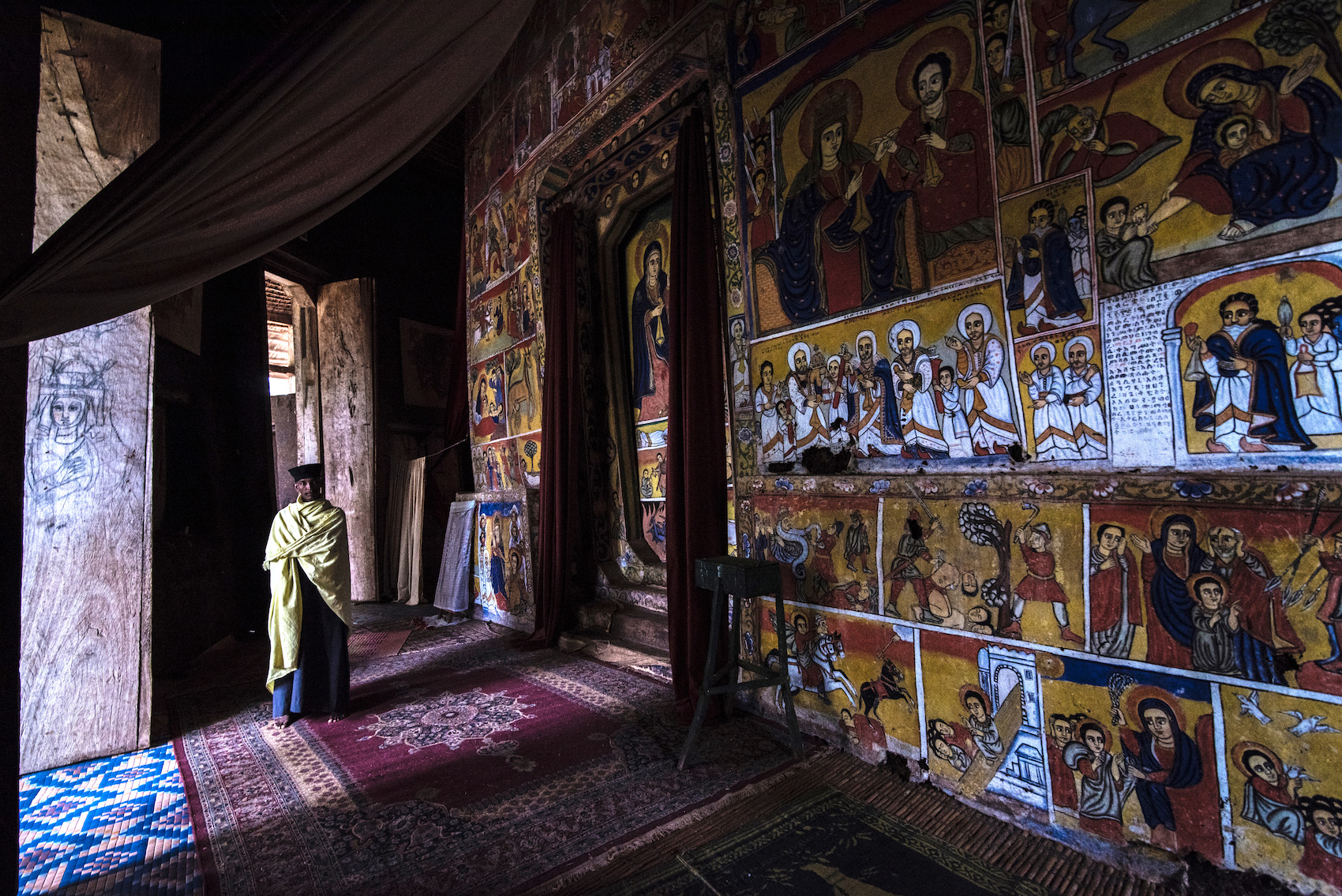
Rose petals under a mosquito net—this was my first impression of Delano Hotel and thus, of Bahir Dar itself. A dramatic appointment for an otherwise forgettable hotel in a completely forgettable city, no doubt, but a telling one.
And one I began to long for the moment I stepped into the dusty minibus station, where I was so immediately importuned by touts that I returned to the comforts of the hotel without so much as attempting to strike a deal with one of them.
“I’m sorry I doubted you,” I conceded to the concierge, my trembling hands clutching a boiling cup of espresso—perhaps the only positive consequence of Ethiopia’s brief Italian occupation. “I’ll take you up on that organized tour.”
I feel like a douche typing words like “concierge” and “tour,” but the fact is that years of being hustled—and, more recently, deliberately avoiding countries where hustlers hang out—have left me wholly unable to cope with even the modest harassment I’d experienced in Addis Ababa, let alone the feeding frenzy that was Bahir Dar.
And I feel like even more of a douche in hindsight: The “organized” tour not only exposed me to at least as many con-men as I imagined I would meet on my own, but exactly zero sights of note, neither Blue Nile Falls (which was a mere trickle, on account of the river having been dammed) nor the monasteries of Laka Tana, except maybe the very last one.
Is this the best you have to offer, Ethiopia? I wondered as I looked upon a 14th-century take on the crucifixion, failing to notice its irony, given my martyred mood.
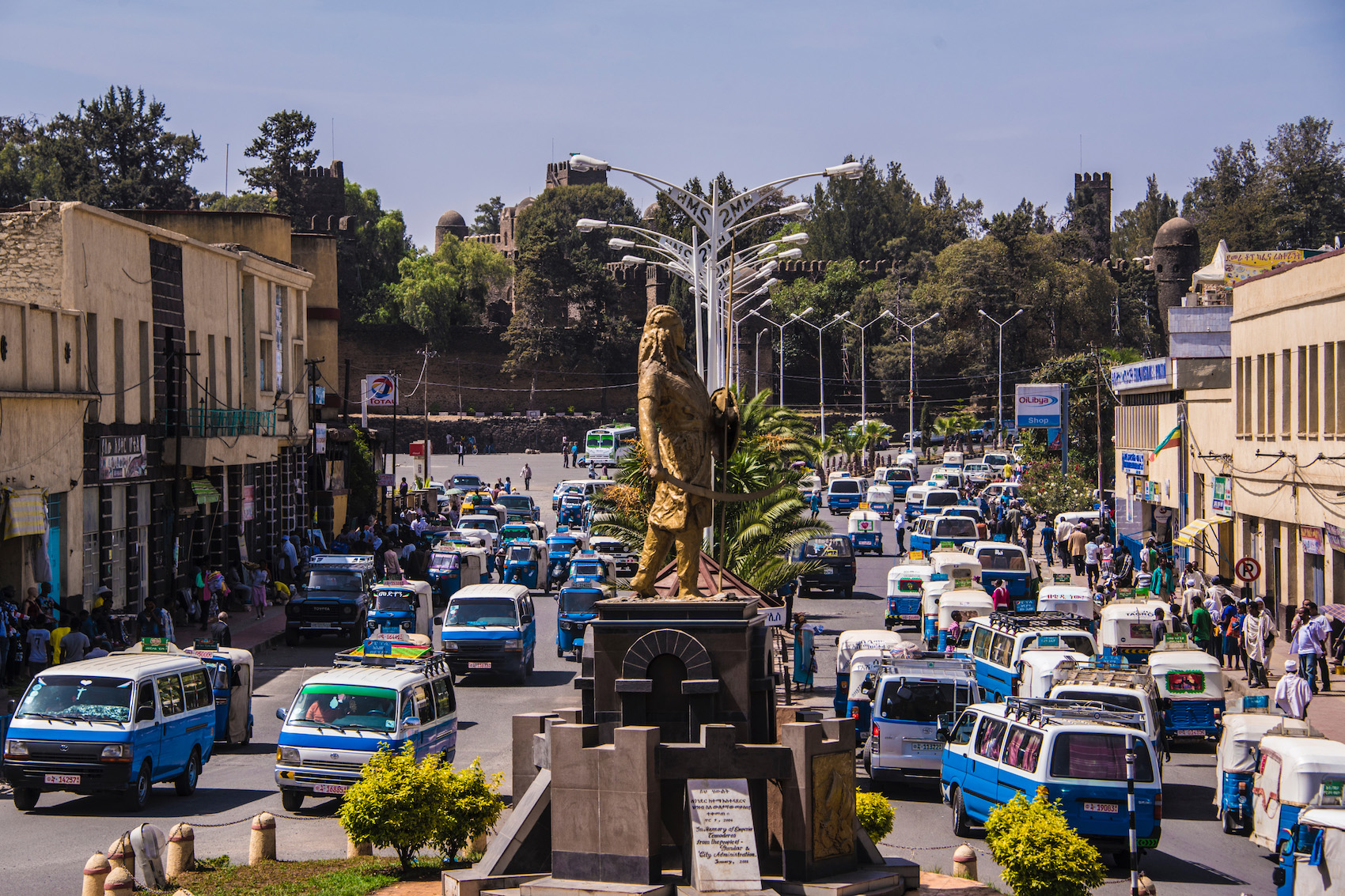
Although the man the gaudy statue in the center of Gondar immortalizes is remembered as an emperor, Téwodros II actually failed at realizing his dream of a reunified state during his lifetime.
Not because his leadership had been ineffective—many historians regard his reign in the mid-19th century as the beginning of modern Ethiopia—but because he committed suicide when he learned the British were coming.
Paul Revere he was not, I laughed as I walked away from the statue and toward Gondar Castle, which had once served as home to emperors like Téwodros, but is today one of the country’s only bonafide tourist traps.
Hearing Téwodros’ story (from a random street hustler—who else?) had struck a chord with me, given the state my first few days in Ethiopia had left me in. I extensively explored the castle, making no less than a dozen rounds through its relatively compact premises as I awaited the beginning of the golden hour, which left me in a sort of trance by the time the I saw the first star in the sky.
A king can’t rule if he offs himself, I closed my eyes as the last ray of sun disappeared. Don’t off your trip to Ethiopia just yet.
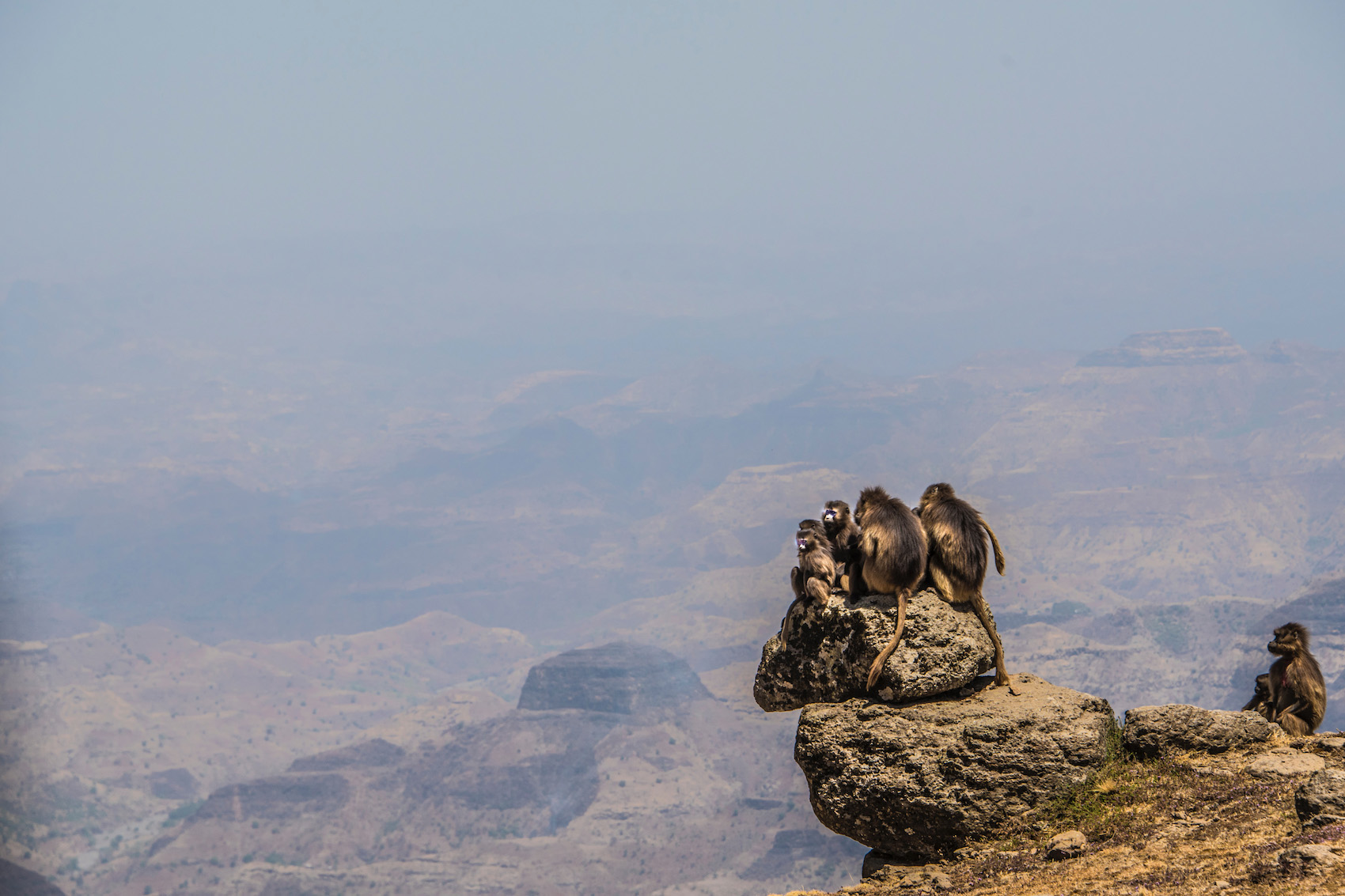
“I don’t mean, like, actually commit suicide,” the girl said in an East Coast accent, then laughed as she stood inches from a high cliff in the Semien Mountains.
Her friend, in a slight Southern drawl, chimed in. “Yeah, there’s a psychological impulse,” she explained, without further elaborating. “That makes you want to jump off the edge, even thought you know you’ll die. I know it sounds like I’m bullshitting you, but it’s real.”
I nodded, even if our conversation evoked the terrible M. Night Shyamalan movie I’d watched on my way over to Ethiopia more than the circumstances of my trip thus far, their aptness notwithstanding.
One of the oldest mountain ranges in Africa, surpassed perhaps only by South Africa’s Drakensberg, the Semiens show their age this time of year, their vegetation a parched yellow after months without rain. The mountains’ endemic gelada monkeys are more visually striking than even sweeping panoramas of the peaks they roam.
Back in Gondar later that evening, having separated from my new American friends, I decided to have dinner at the Goha Hotel, famous for its own panoramic views. My chicken kabob, apparently “locally-inspired,” had left me decidedly without inspiration.
As I walked out of the hotel, I noticed the bajaj driver who’d brought me up the hill was still in the parking lot. Ordinarily, I would’ve seen him being there as opportunistic, but something compelled me not to judge him so quickly. He probably doesn’t get to see the city from this perspective very often.
Just then, he startled and turned around. “I take you home?”
“Yes,” I hopped into his tuk-tuk. My heart feels soft, I put my hand on it.
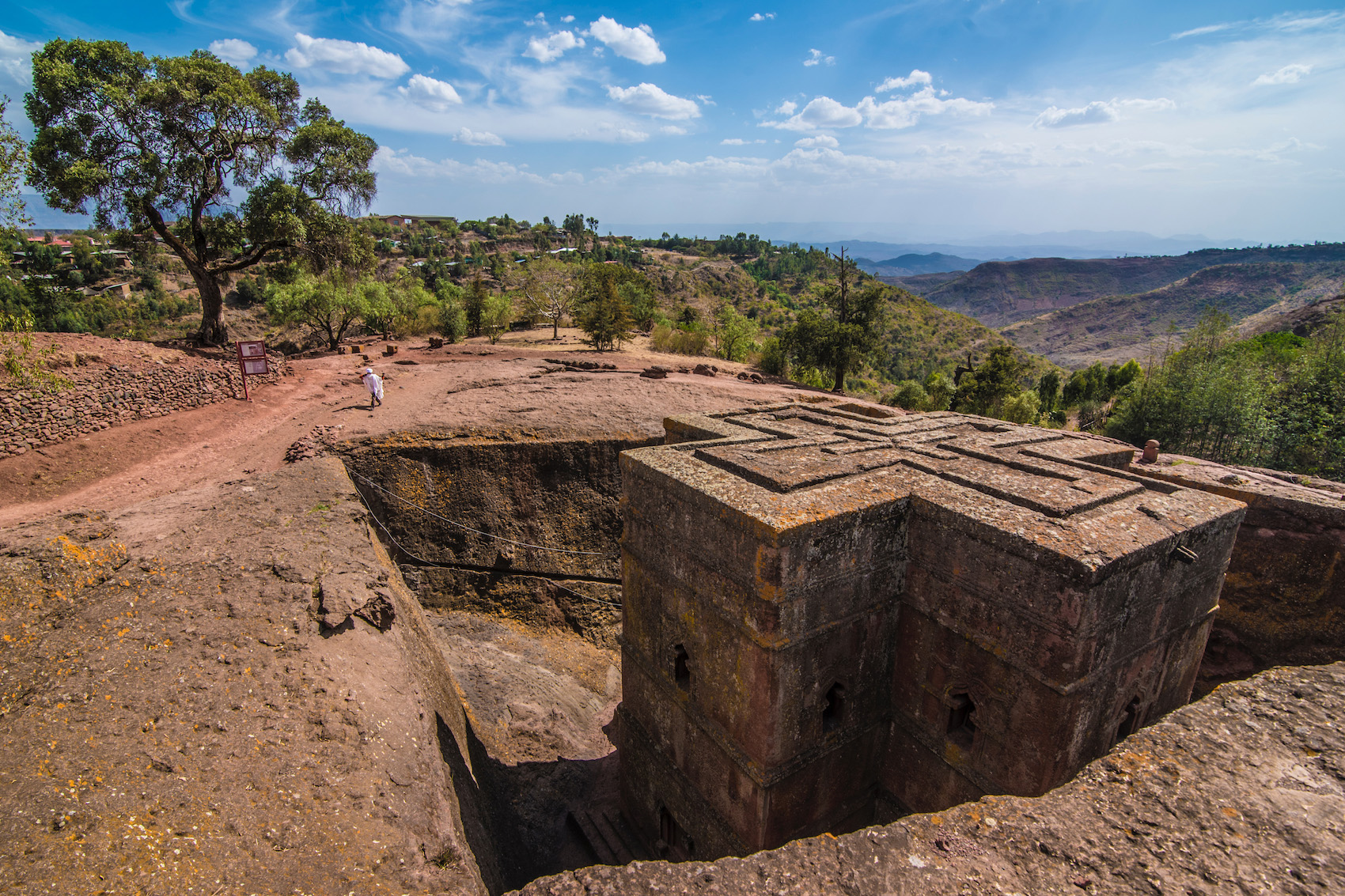
I briefly considered reprimanding the older man who was throwing stones at the young boys who approached my window, but before I could, my driver interrupted.
“Pay these boys to take you to the lion,” he said, after having rolled down the window and shooed away their would-be assailant. “Maybe 10 or 20 birr each.”
The stone-thrower, for his part, was undeterred. He stumbled away laughing, using his vintage Bet Giyorgis tee (he was something of a middle-aged hipster, albeit an unintentional one) to wipe the sweat off his face.
That’s about how I felt about Lalibela, too, I laughed, reflecting not only the food poisoning that had marred my stay in what had previously been the most-anticipated city of my trip to Ethiopia, but also how fucking boring “Lali” was, save for the cross-shaped, rock-hewn church depicted on the shirt.
Soon, however, he was completely out of sight, and I was on my way through a forest of decidedly unhewn stones, my final destination—an ancient rock carving known as the Lioness of Gobedra—notwithstanding.
That was nice, I thought to myself as I began the journey back down from the carving, only moments after having reached it. More the hike than the lion, though—these boys are really fast! Say, where are they, anyway?
My escorts (and thus, my impetus to keep a certain pace) gone, I reached down to get my camera out of my bag and capture the rainbow that had appeared over the nearby city of Axum. But where was my envelope filled with money?
Just then, I spotted one of the boys, who must’ve known from the glare in my eye that I’d discovered his wrongdoing.
I’m gonna kill that little motherfucker if I find him, I screamed silently as I began running, wishing I had seen what had happened earlier as admonition, rather than abuse: Sometimes, throwing stones is a king’s only recourse.
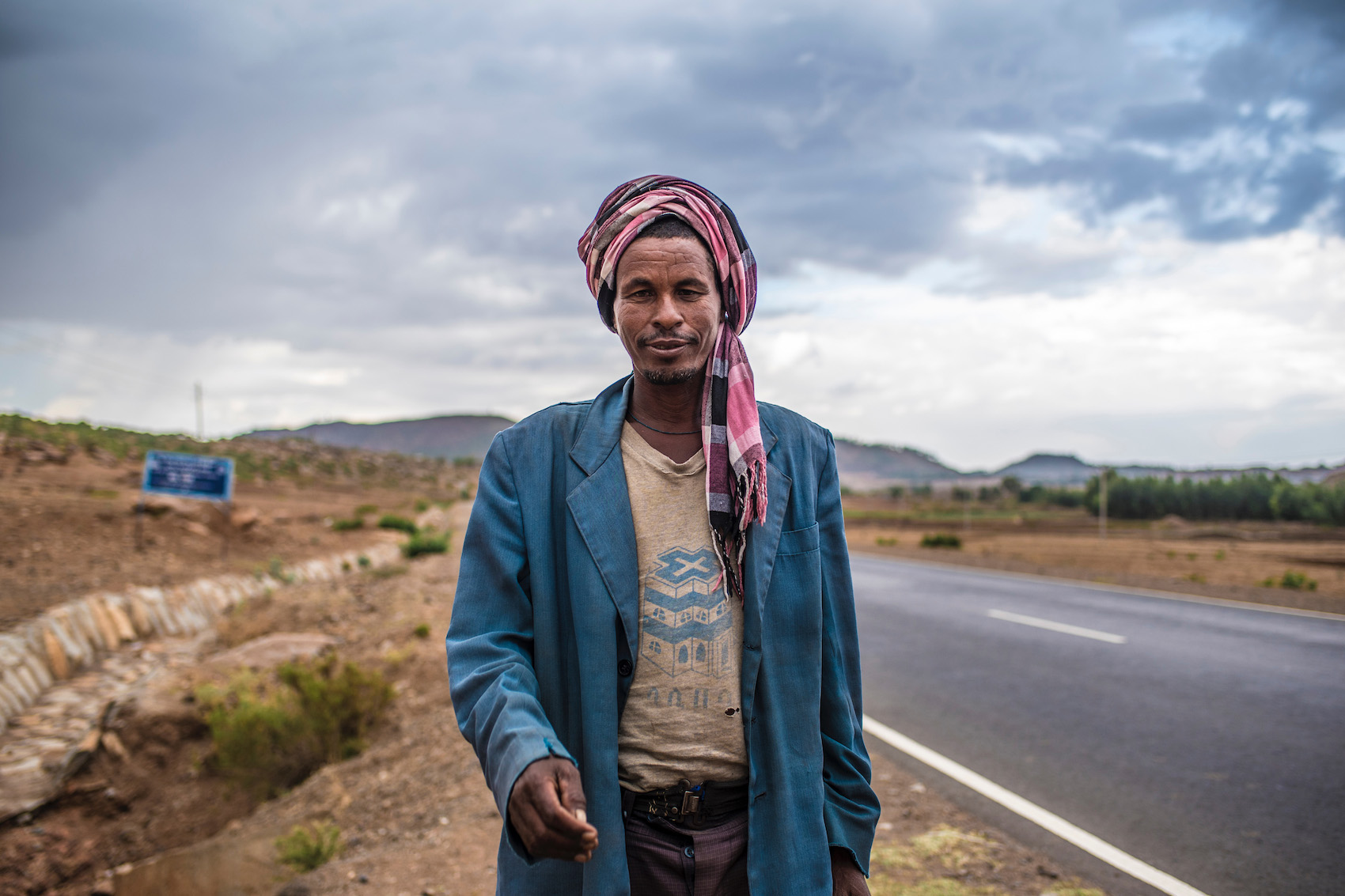
“You should tip him,” my guide scolded me, referring to the man who’d given me a harness for the vertical, rock-scaling portion of the climb up to Abuna Yemata Guh, a 5th-century church carved into a cliff several hundred feet above a canyon in rural Tigray state.
“I paid $300 for this tour,” I attempted to grin through my grinding teeth as I stepped out of the harness. “The least y’all can do is make sure I don’t die for that amount.”
“You’re smart,” he chuckled and handed the man a couple hundred birr from his own pocket. “Most tourists would’ve paid up.”
I shook my head. “Ethiopia has definitely been a learning experience.
“Is that a priest?” I changed the subject as I noticed a robed figure mounting the final ascent up to the church.
“A monk,” he corrected me. “Those guys can’t marry—or fuck.”
“I’m sure they do anyway.”
“I would go crazy,” he continued, clearly not having gotten my reference to Catholic shenanigans, and making a spinning gesture beside his ear.
In spite of his clearly advanced age, the monk glided up the side of the mountain with incredible ease and agility—although he’d only been a couple steps ahead of us on flat ground, he beat us to the summit by a good minute.
As I watched the him coast along the edge of the cliff, the grains of sand his feet eroded off the stone falling silently to the desert floor beneath, I realized how pointless it was to hold onto the resentment I’d built up on my trip: It is not the speed with which you climb a mountain, but the grace with which you look upon everything beneath it that makes you royal.
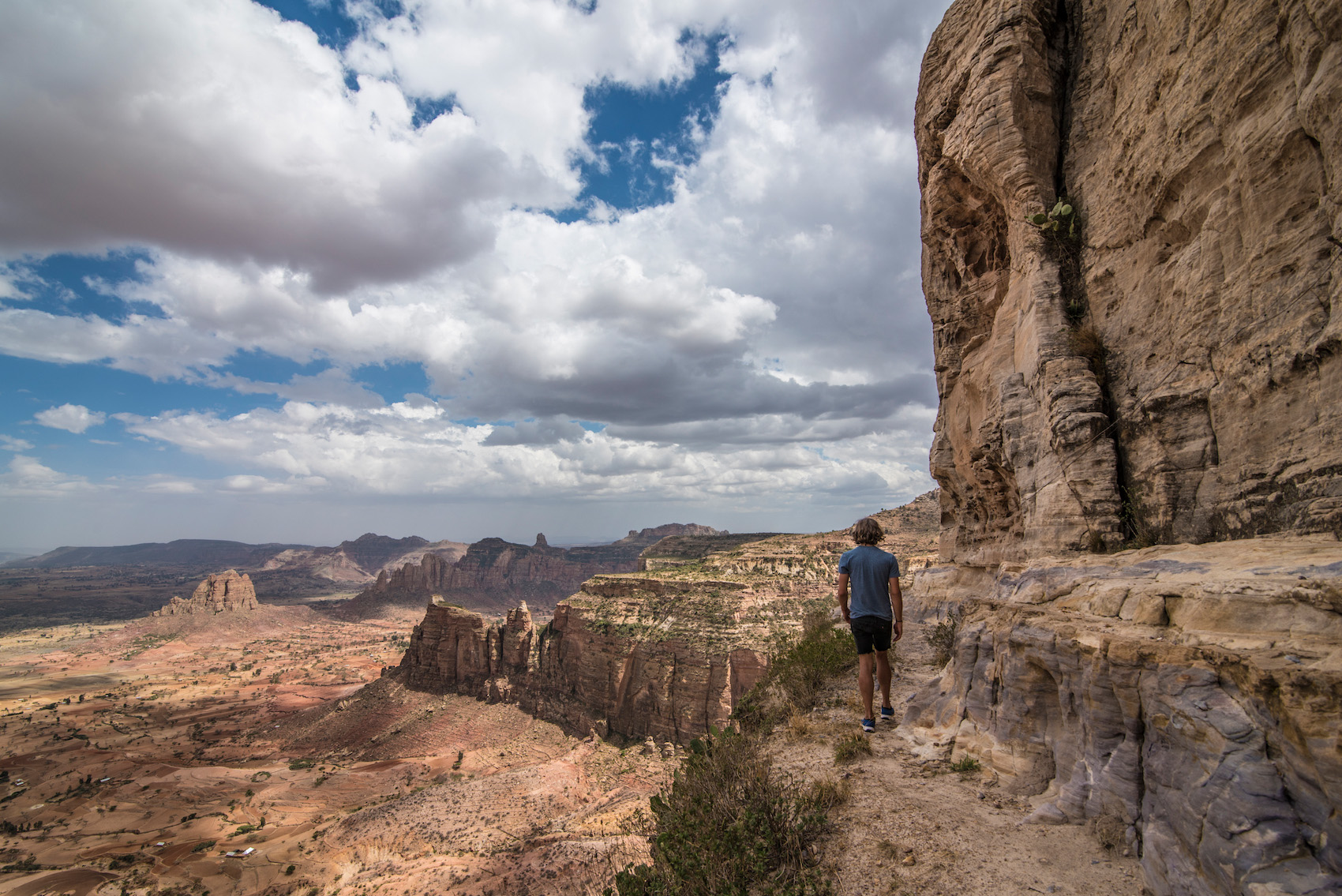
“What’s your name, by the way?” I asked the young woman at the tour desk in Mekele, the final stop of the first leg of my trip to Ethiopia.
She smiled. “Ababa.”
“Flower?” I clarified.
“Yes,” she laughed. “Like—”
“Addis Ababa,” I finished for her, recollecting on the conversation I’d had outside the Red Terror Museum.
She seemed perplexed. In a good way, but perplexed nonetheless.
I expected her to ask me how I knew the meaning of her name, but instead she simply handed me the itinerary for my Danakil Depression tour and bid me farewell.
I began reading it as I made my way up to my hotel room, which was just above the tour company office. This volcano, the page explained, is also known as the “Door to Hell.” I laughed, recalling the various times on my trip up to that point I’d felt like I’d been on satan’s stoop.
I entered my room and walked out onto the balcony to admire the castle of Yohannes IV, a late 19th-century Ethiopian emperor who died as a result of the hubris with which he approached an ill-advised war with Sudan.
As the late evening sky went began turning from blue to black, I closed my eyes and imagined how Yohannes must’ve felt the moment the bullet that would take his life entered his body.
Yohannes gave up his crown to his own princes of darkness, I noted. Don’t be like Yohannes.

Robert Schrader is a travel writer and photographer who’s been roaming the world independently since 2005, writing for publications such as “CNNGo” and “Shanghaiist” along the way. His blog, Leave Your Daily Hell, provides a mix of travel advice, destination guides and personal essays covering the more esoteric aspects of life as a traveler.








